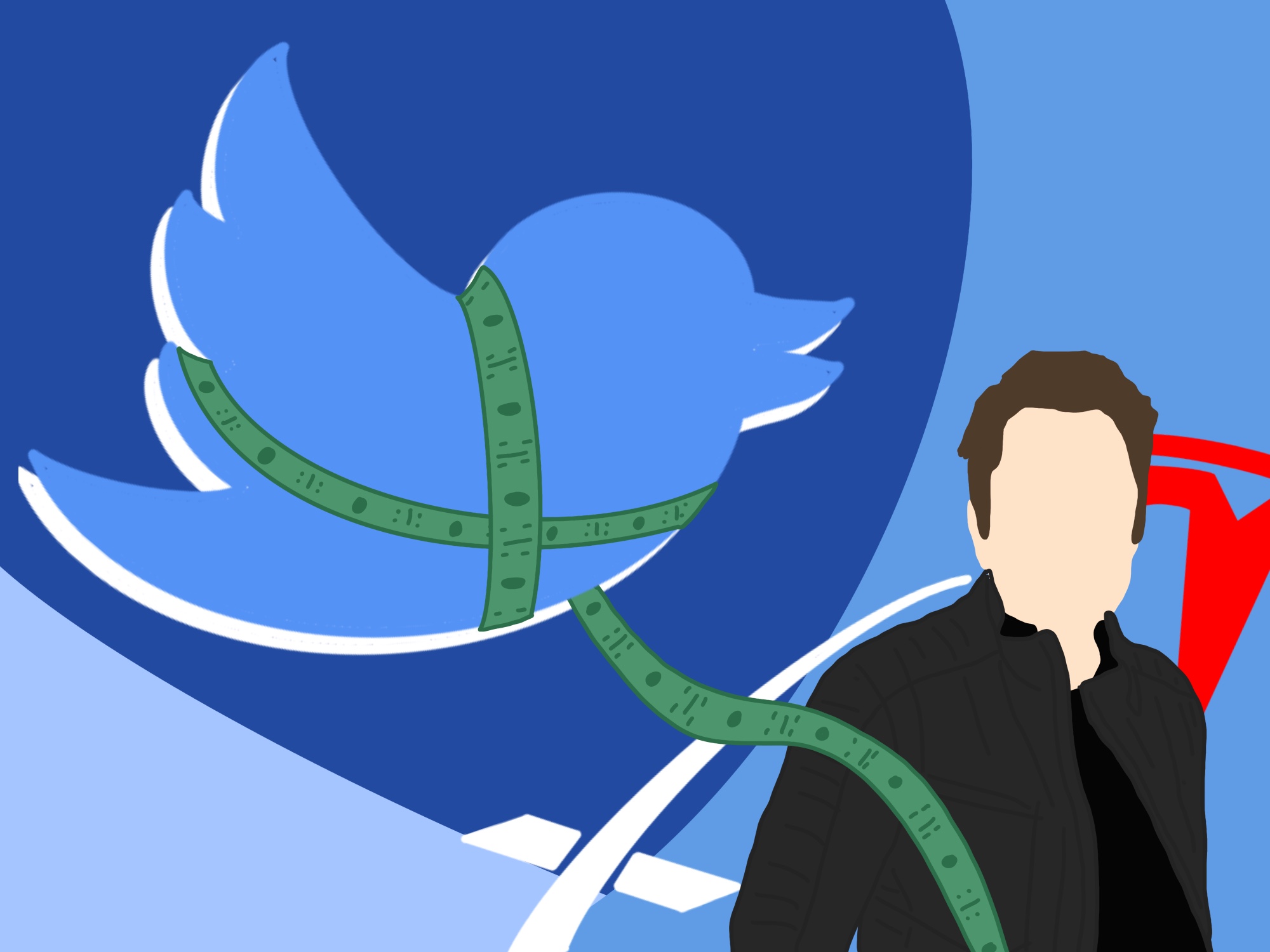Twitter — probably the only platform where a man’s plea for free chicken nuggets could receive more retweets than a quote from Malala. Over the years, Twitter has amassed an interesting melting pot of users: tyrannical world leaders, job-hungry journalists and 20-somethings with too much time on their hands, to name a few. These various impassioned parties tweeting on our timelines have worked to create a dynamic yet incredibly chaotic app that is often the battleground for our culture’s most pressing debates.
The sense of absurdity pervading the platform is perhaps best encapsulated by the announcement of its new owner. Elon Musk, world’s richest man and father of a child named X Æ A-Xii — who he had with self-proclaimed “Marie Antoinette-Esque Symbol of Inequality” musician Grimes— has announced he will buy Twitter for $44 billion.

Musk’s purchase has brought with it much publicity, due in no small part to his ambitious plans for the platform. First and foremost, he plans to expand free speech, a move that is in direct contradiction with the recent push to limit hateful and terrorist rhetoric on Twitter. Musk’s free speech plans have even led many to speculate Trump could be invited back to the platform.
The billionaire also hopes to install an edit feature for Tweets. Though perhaps beneficial for typos, the vision of Trump not only returning to Twitter but being able to change “covfefe” into whatever word he actually meant to type has not helped quell the media frenzy erupting over the purchase.
But a lot of these dramatized consequences may not come to pass. In an open letter to their employees, one Twitter executive emphasized that fighting “hate speech and trolls” was “bigger than any board member.” Additionally, between falling Tesla stocks and Musk’s dependence on China, a country with hostile relations to Twitter, the platform is looking more and more like the elusive other woman whom Musk can neither afford nor keep around without significant threat to his existing commitments. Already, news media outlets are predicting a renege on his promise to buy Twitter.
Whatever happens, at the end of the day Twitter is a business, and Musk — who currently only owns 9.2% of the company — doesn’t have the complete influence, nor the lack of business savvy to turn Twitter into the lawless swamp some fear it will become. Once the speculation has cleared, the internet’s new favorite purchase is nothing more than a billionaire conducting standard business with other billionaires.
But maybe there’s a purpose to all this attention. Instead of looking at the absurdity of a man with falling stocks and Trump sympathies splurging the small sum of $44 billion, we should focus on the absurdity of him having $44 billion to spend in the first place.
On Nov. 3, 2021 World Food Program Chief David Beasley tweeted that it would take $6.6 billion to solve world hunger. In response, Musk asked for a breakdown of how this money would be spent to solve the crisis. The organization then provided its plan, but received no hunger-stopping stipend from the billionaire. Ironically, this exchange took place on the exact platform the billionaire bought to fulfill his first amendment fantasies instead of using a fraction of that amount to end famine.
Before the 1% starts preaching about the charities they already donate to and the self-made money they should be free to spend however they see fit — never mind the fact that most of it comes from the family coffers — let me make one thing clear. The problem isn’t that billionaires aren’t funneling their wealth into the common good, it’s that they have so much money when the vast majority of people are barely scraping by.
Somehow we have become desensitized to the crippling wealth gap that exists, and the daily dealings of billionaires receive endless mentions while 42 million people on the brink of famine is just another glanced-over tweet. It seems the Malala-chicken-nugget phenomenon pervades more than just Twitter, distorting our perception of what deserves attention and rendering serious societal issues utterly ignorable.
Given Musk’s penchant for the controversial, it’s no surprise the internet has reacted so dramatically to him potentially purchasing Twitter. After all, it’s more entertaining to discuss Trump returning to the platform and the cocaine coming back to Coca Cola — see the billionaire’s latest tweet — than the destructive wealth distribution allowing Musk to dangle these possibilities in front of our faces.
Whether or not Musk goes through with his purchase, Kpop fans will still stan their biases, woke Twitter will still send out the latest cancellation assignment and the sun will rise tomorrow morning. The important thing to take away from this is what the billionaire’s game of cat-and-mouse reveals — toying with keyboard-happy Twitter users is worth seven times the price of ending world hunger.

















































































































Killer Marmot • May 3, 2022 at 10:35 am
People are not starving because of a lack of money donations.
The main reason people starve is because they are in a war zone. Their crops are destroyed or their food stores are seized or destroyed, and the rest of the world can not get food to them. All the money in America can’t solve that.
Tara Banerjee • Apr 29, 2022 at 9:37 am
You write amazingly well Suj …. This is brilliant
Mahadev Raman • Apr 28, 2022 at 8:08 pm
Another well-written article Sujena! If you haven’t read it already, you might like Davos Man by Peter Goodman, where he explains how the ridiculous wealth inequality you talk about came to be.